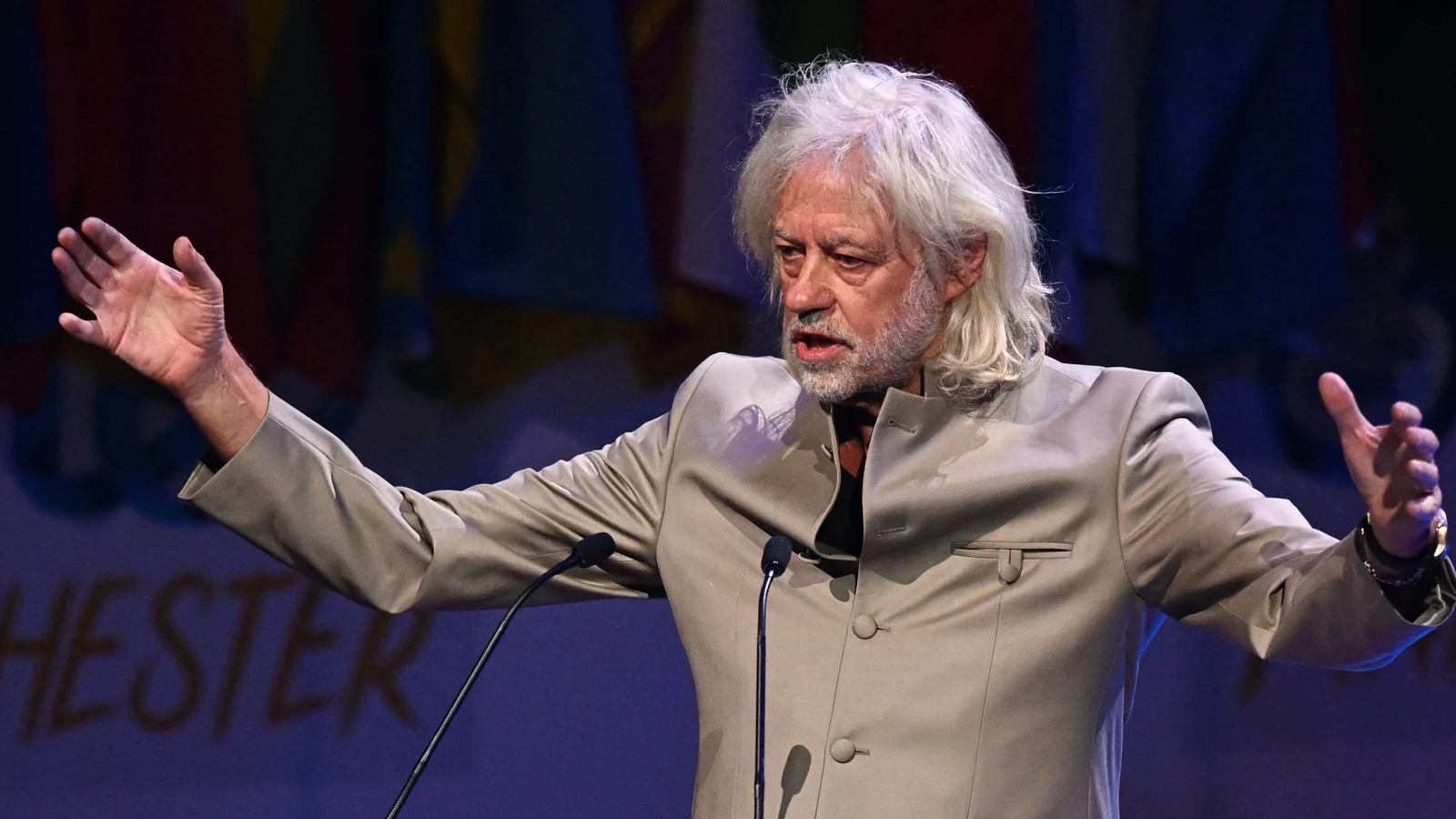“Do They Know It’s Christmas,” the iconic charity single released in 1984 by the supergroup Band Aid, has remained a staple of holiday playlists for nearly four decades. Written by Bob Geldof and Midge Ure, the song was a heartfelt response to the Ethiopian famine, raising millions of dollars for famine relief. Despite its noble intentions and significant impact, the track has faced persistent criticism for its lyrics and portrayal of Africa.
Recently, Bob Geldof, the driving force behind the project, has addressed these criticisms, describing the song as an “instrument of change” and defending its legacy. In this article, we delve into the song’s history, the criticisms it has faced, and Geldof’s perspective on its role as a catalyst for global awareness and action.
The Birth of a Cultural Phenomenon
In late 1984, reports of a devastating famine in Ethiopia dominated the headlines, with millions of people facing starvation. Bob Geldof, then a rock musician and frontman of The Boomtown Rats, was deeply moved by the images and stories coming out of Africa. He teamed up with Midge Ure of Ultravox to create a charity single that would bring together some of the biggest names in British and Irish music.
The result was “Do They Know It’s Christmas,” recorded in a single day by artists including Bono, George Michael, Boy George, and Sting. The song’s poignant lyrics and anthemic melody captured the public’s attention, and it quickly became the fastest-selling single in UK history at the time. The proceeds from the song were used to fund food and medical aid for famine-stricken regions in Ethiopia.
Band Aid’s success inspired similar efforts worldwide, including the USA for Africa project and the Live Aid concerts in 1985, solidifying the song’s place in the history of global humanitarian efforts.
The Criticism: Oversimplification and Stereotypes
While “Do They Know It’s Christmas” achieved remarkable success and raised awareness about the Ethiopian famine, it has not been without its detractors. Over the years, critics have highlighted several issues with the song:
- Simplistic and Patronizing Lyrics
The lyrics, such as “There won’t be snow in Africa this Christmas time” and “Where nothing ever grows,” have been criticized for perpetuating stereotypes about Africa as a monolithic continent defined by poverty and despair. Critics argue that these lines ignore Africa’s diversity, rich cultures, and varied climates. - Eurocentrism
The song’s title and theme suggest a Eurocentric perspective, with Christmas being used as a universal benchmark. Critics point out that many Ethiopians are Orthodox Christians who celebrate Christmas on January 7, and the idea of “knowing it’s Christmas” does not resonate universally. - The “Savior Complex”
Some have accused the song of promoting a “white savior” narrative, where Western artists appear to be the heroic figures swooping in to “save” Africa. This narrative, critics argue, undermines the agency of African communities and overlooks the systemic issues that contribute to poverty and famine. - Outdated Approach
As global perspectives on aid and development have evolved, some argue that “Do They Know It’s Christmas” represents an outdated, charity-focused model of addressing global issues rather than advocating for systemic change and equitable partnerships.
Bob Geldof’s Defense: A Necessary Catalyst
In response to these criticisms, Bob Geldof has consistently defended the song, emphasizing its purpose and impact. Speaking recently, he described “Do They Know It’s Christmas” as an “instrument of change” rather than a flawless piece of art.
Geldof acknowledged the song’s shortcomings, admitting that the lyrics may not fully capture the complexity of the issues. However, he emphasized that the primary goal was to raise awareness and funds quickly in response to an urgent crisis.
“People can dissect it all they want,” Geldof said. “But the fact remains: the song raised millions, it fed people, it saved lives. It was never meant to be a sociological study or a cultural commentary. It was a call to action.”
The Impact: A Global Movement
Despite the criticisms, it is undeniable that “Do They Know It’s Christmas” had a profound impact on global awareness of famine and humanitarian crises.
- Fundraising Success
The single raised over £8 million in its first year and has continued to generate funds through re-releases and royalties. These funds have supported famine relief, medical aid, and long-term development projects in Ethiopia and beyond. - Inspiring Other Initiatives
The success of Band Aid paved the way for similar efforts, including “We Are the World” by USA for Africa and the Live Aid concerts, which collectively raised hundreds of millions of dollars for humanitarian causes. - Shifting Public Perception
The song brought the issue of famine into the homes of millions of people, sparking conversations about global inequality and the responsibilities of wealthier nations. - Encouraging Celebrity Activism
“Do They Know It’s Christmas” demonstrated the power of celebrity influence in mobilizing resources and attention for social causes, inspiring countless charity singles and events in the decades since.
Balancing Legacy and Critique
The legacy of “Do They Know It’s Christmas” is complex. On one hand, it stands as a testament to the power of collective action and the impact of art as a force for change. On the other hand, it serves as a reminder of the importance of nuance, representation, and cultural sensitivity in addressing global issues.
Bob Geldof has expressed a willingness to engage with these critiques, noting that they highlight the evolving understanding of global development and the need for more inclusive approaches. “The world has changed since 1984, and so have our perspectives,” he said. “But the core message remains: we can make a difference if we act together.”
A New Lens for Humanitarian Efforts
As we reflect on “Do They Know It’s Christmas” and its enduring influence, it’s essential to consider how future humanitarian efforts can learn from its successes and shortcomings. Modern initiatives must prioritize collaboration with affected communities, focus on systemic change, and celebrate the dignity and diversity of those they aim to support.
The song’s legacy, while imperfect, serves as a foundation for these ongoing conversations. It reminds us that art can spark action, but true change requires listening, learning, and evolving.
Conclusion: The Enduring Message
“Do They Know It’s Christmas” continues to evoke strong emotions, from nostalgia and admiration to critique and debate. For Bob Geldof, the song’s ultimate significance lies in its impact: “It wasn’t about us. It was about them. And it worked.”
As we celebrate the holiday season and revisit this iconic track, it’s worth acknowledging both its transformative role in humanitarian history and the lessons it offers for creating a more equitable and inclusive world.



